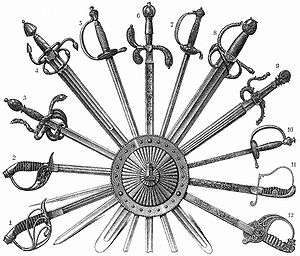Dao (Naga sword)
Dao is the sword of the Naga people of Northeastern India, mainly in the Indian states of Assam and Nagaland. The sword, with its wooden hilt, and unique square form is used for digging as well as for killing.[1]
| Dao | |
|---|---|
_with_Scabbard_and_Baldric_MET_36.25.1630a_b_001_Mar2017.jpg) Assamese Dao with scabbard, 19th-century | |
| Type | Sword |
| Place of origin | Northeast India |
| Service history | |
| Used by | Naga people |
| Specifications | |
| Mass | 266.5 grams (9.40 oz) |
| Length | 45 centimetres (18 in)-65 centimetres (26 in) |
| Width | 5.1 centimetres (2.0 in) |
| Blade type | Single edge |
| Hilt type | wood, cane |
| Scabbard/sheath | wood, cane |
| Head type | steel |
Form
The dao broadsword can be found in the northeastern region of Assam and Nagaland in India where the Naga people lives. The dao has a thick and heavy form, with length varies between 45 centimetres (18 in) to 65 centimetres (26 in). The unique design of this long backsword is that instead of a point, the tip of the sword is a bevel, creating an appearance of a squarish shape. This form is also found in the Burmese dha whose form is derived from the dao. The form of the dao was first adopted by the Kachin people. From here the form would evolve to the more elongated dha.[2]
The blade of the Dao is almost straight, with a very minimal curve that can only be discerned upon close examination. The blade is heavy and chisel-edged. It has a unique form that it is narrowest at the hilt and the gradually broaden to the endpoint.[3]
The wooden hilt has a very simple shape, without a guard or without a distinguished pommel. Bamboo root is considered to be the best material for the hilt. The grip of the handle is sometimes wrapped with basketry. Sometimes the hilt is decorated with a bronze cap at the bottom.[2] The hilt may also be made of ivory, and occasionally can be well-carved.[3]
Dao is usually carried in an open-sided wooden scabbard which is fastened to a rattan belt hoop.[3] The scabbard is centrally hollowed out on one face.[2]
Multi-function
The dao is almost the only tool that was used by the Naga people. It is used for many purposes e.g. for building houses, to clear the forest, to dig the earth, to make the women's weaving tools, and to create any kind of wooden objects. The dao is also used as a weapon.[3]
See also
References
Cited works
- Burton, Richard F. (1987). The Book Of The Sword. London: Dover. ISBN 0-486-25434-8.CS1 maint: ref=harv (link)
- Greaves, Ian A.; Bowditch, Mark I.; Winston, Andrew Y. (2005). "THE SWORDS OF CONTINENTAL SOUTHEAST ASIA". Ars Cives Creativity. Ars Cives Creativity. Retrieved November 15, 2017.CS1 maint: ref=harv (link)
- Jones, Lee A. (1999). "Sword-daos of the Hill Tribes of Assam and Nagaland (northeastern India) and of the Kachin Peoples (northern Burma (Myanmar))". Viking Sword. Viking Sword. Retrieved November 15, 2017.CS1 maint: ref=harv (link)
- Stone, George Cameron (2013). A Glossary of the Construction, Decoration and Use of Arms and Armor: in All Countries and in All Times. Dover: Courier Corporation. ISBN 9780486131290.CS1 maint: ref=harv (link)
- van Zonneveld, Albert G. (2001). Traditional Weapons of the Indonesian Archipelago. C. Zwartenkot Art Books. ISBN 9789054500049.CS1 maint: ref=harv (link)
